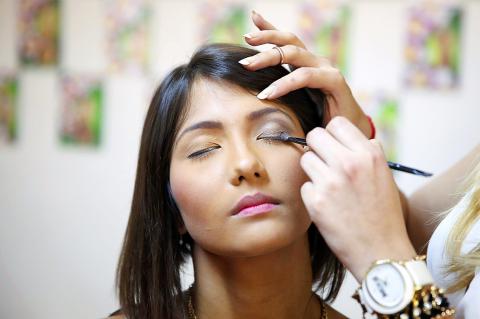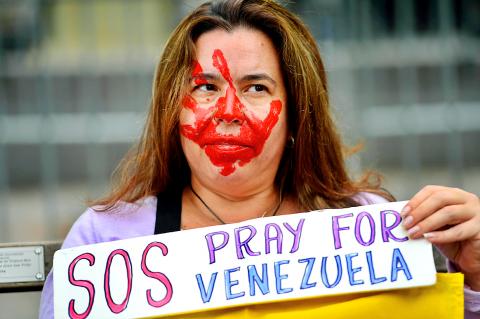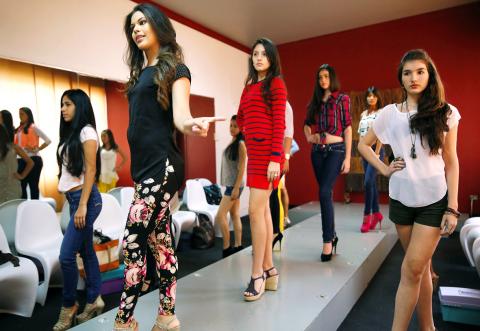Venezuela’s famed models and aspiring beauty queens are struggling to doll themselves up as shortages turn eye shadow and breast implants into coveted luxuries.
In a country that glorifies voluptuous women and opulent beauty pageants, even basics like deodorant are now at times tricky to find as strict currency controls have led to a scarcity of US dollars for imported goods.
Still, determined models and pageant competitors are doing their utmost to keep the show going.

Photo: Reuters
“I exhaust myself visiting pharmacies; I look everywhere for makeup,” said Ileanne Davila, a 19-year-old student and model.
“Once I couldn’t find red eye shadow ... so I used lipstick,” she said as she took a break from a photo shoot. “I can’t find powder for my skin color. So sometimes I mix two hues.”
Davila is one of dozens of girls aged three and up who attend a modeling academy run by Gisselle Reyes, a former Miss Venezuela candidate who now prepares girls for the pageant. Yet even at this glamorous holdout in Caracas’ affluent Altamira area, shortages are crimping plans to follow in Reyes’ footsteps — sometimes quite literally.

Photo: AFP
Young girls don their mothers’ heels because they cannot find their size. Teachers make them work the runway barefoot, or strap them into their mothers’ shoes with tape.
Girls share makeup and look up YouTube videos on making deodorant at home. Even when they can find the products they want, some are unable to pay for them as scarcity drives up prices.
Davila estimates that the price of a good face powder, for instance, has increased 500 percent in the past 18 months.

Photo: Reuters
Even aspiring Miss Venezuelas are having trouble getting their hands on makeup ahead of the pageant on Oct. 9, said an instructor who, like the candidates, is barred from speaking to the press in the runup to the event.
The quest for beauty is one of the rare pastimes that unites the polarized oil-rich nation. The country boasts seven Miss Universes — topped only by the US. Venezuela is thought to have one of the highest rates of breast implants in the world and plastic surgeries are sometimes given as raffle prizes.
However, doctors now say that beloved Botox and breast implants can be hard to come by.
When Maria Eugenia Espinoza decided to replace her implants, equivalent to bra size 36, she was told only implants equivalent to size 42 and up were available.
“Imagine, I would have looked like one of those dancing girls,” the 46-year-old mother of two said.
After searching for five months, Espinoza found implants in the nick of time for her scheduled operation.
Critics have long said that Venezuela’s cult of beauty objectifies women and promotes shallow values. Osmel Sousa, the president of the Miss Venezuela pageant, gave them more ammunition last year when he said ugly women invented the concept of inner beauty to feel better about themselves.
Shortages of beauty products can seem frivolous when compared with the scarcity of medicines and basic goods from flour to diapers.
Venezuela’s scarcity index hit a record 28 percent in January, indicating that 28 of 100 basic consumer goods were scarce. The Central Bank if Venezuela has not given data on shortages since.
Currency controls first enacted by former Venezuelan president Hugo Chavez more than a decade ago mean firms struggle to get hold of the hard currency for imports.
Chavez’s hand-picked successor, Venezuelan President Nicolas Maduro, blames the shortages on smugglers who buy price-controlled goods to resell them on the black market or in Colombia.
Some government supporters scoff that a pampered elite is overstating the magnitude of shortages to try to weaken the president.
Venezuela is grappling with 60 percent annual inflation and sky-high crime rates, and is widely believed to be in recession. Maduro says the country’s problems are the result of an “economic war” waged against him by Venezuelan business leaders and foreign companies.
Yet, paradoxically, some say the hardships are actually pushing some Venezuelans to dedicate even more time to their appearance.
“Venezuelans ... might not have enough money to eat, but they’ll have enough money to be beautiful,” said Miguel Torres, who runs a beauty parlor.
Greisy Palacios, a receptionist, spends hours in lines for everything from soap to nail polish remover and says she would only go out without makeup if depressed.
“If you’re not made up, don’t go out,” she said as she got a manicure.
Yet Palacios is finding it ever harder to abide by that mantra. Recently, some friends alerted her that razors had arrived at a nearby pharmacy and Palacios dashed out of the office to get some.
“But the lines are like a kilometer long, just for razors,” she said. “I’m going crazy waiting for the country to change. I regret voting for Maduro.”
The industry that caters to image-conscious Venezuelans is also feeling the pinch.
In a Caracas salon, beautician Janeth Canaveral points to a dozen pots of creams and wax: “That’s what I have left,” she said.
At this rate, Canaveral, a single mother of three, said she will be forced to close her salon in a year.
Barber Daniel Eduardo said he spends his days off hunting down products.
“If I don’t have wax I go out to walk and look for some,” he said in Caracas’ Catia slum. “And if there’s no wax, well, I use gelatin. You have to be a magician here.”
Bigger companies are often better able to cope with red tape and expensive imports.
Nidal Nouaihed, a designer who has dressed the current Miss Venezuela, hired five people to help him import fabrics. Costs have skyrocketed, but he said his high-end business is still booming.
“During times of crisis, there’s a lot of anxiety and people want more luxury, want to be more glamorous, they want to forget,” Nouaihed said. “We create a parallel world.”

CAUTIOUS RECOVERY: While the manufacturing sector returned to growth amid the US-China trade truce, firms remain wary as uncertainty clouds the outlook, the CIER said The local manufacturing sector returned to expansion last month, as the official purchasing managers’ index (PMI) rose 2.1 points to 51.0, driven by a temporary easing in US-China trade tensions, the Chung-Hua Institution for Economic Research (CIER, 中華經濟研究院) said yesterday. The PMI gauges the health of the manufacturing industry, with readings above 50 indicating expansion and those below 50 signaling contraction. “Firms are not as pessimistic as they were in April, but they remain far from optimistic,” CIER president Lien Hsien-ming (連賢明) said at a news conference. The full impact of US tariff decisions is unlikely to become clear until later this month

GROWING CONCERN: Some senior Trump administration officials opposed the UAE expansion over fears that another TSMC project could jeopardize its US investment Taiwan Semiconductor Manufacturing Co (TSMC, 台積電) is evaluating building an advanced production facility in the United Arab Emirates (UAE) and has discussed the possibility with officials in US President Donald Trump’s administration, people familiar with the matter said, in a potentially major bet on the Middle East that would only come to fruition with Washington’s approval. The company has had multiple meetings in the past few months with US Special Envoy to the Middle East Steve Witkoff and officials from MGX, an influential investment vehicle overseen by the UAE president’s brother, the people said. The conversations are a continuation of talks that

CHIP DUTIES: TSMC said it voiced its concerns to Washington about tariffs, telling the US commerce department that it wants ‘fair treatment’ to protect its competitiveness Taiwan Semiconductor Manufacturing Co (TSMC, 台積電) yesterday reiterated robust business prospects for this year as strong artificial intelligence (AI) chip demand from Nvidia Corp and other customers would absorb the impacts of US tariffs. “The impact of tariffs would be indirect, as the custom tax is the importers’ responsibility, not the exporters,” TSMC chairman and chief executive officer C.C. Wei (魏哲家) said at the chipmaker’s annual shareholders’ meeting in Hsinchu City. TSMC’s business could be affected if people become reluctant to buy electronics due to inflated prices, Wei said. In addition, the chipmaker has voiced its concern to the US Department of Commerce

STILL LOADED: Last year’s richest person, Quanta Computer Inc chairman Barry Lam, dropped to second place despite an 8 percent increase in his wealth to US$12.6 billion Staff writer, with CNA Daniel Tsai (蔡明忠) and Richard Tsai (蔡明興), the brothers who run Fubon Group (富邦集團), topped the Forbes list of Taiwan’s 50 richest people this year, released on Wednesday in New York. The magazine said that a stronger New Taiwan dollar pushed the combined wealth of Taiwan’s 50 richest people up 13 percent, from US$174 billion to US$197 billion, with 36 of the people on the list seeing their wealth increase. That came as Taiwan’s economy grew 4.6 percent last year, its fastest pace in three years, driven by the strong performance of the semiconductor industry, the magazine said. The Tsai